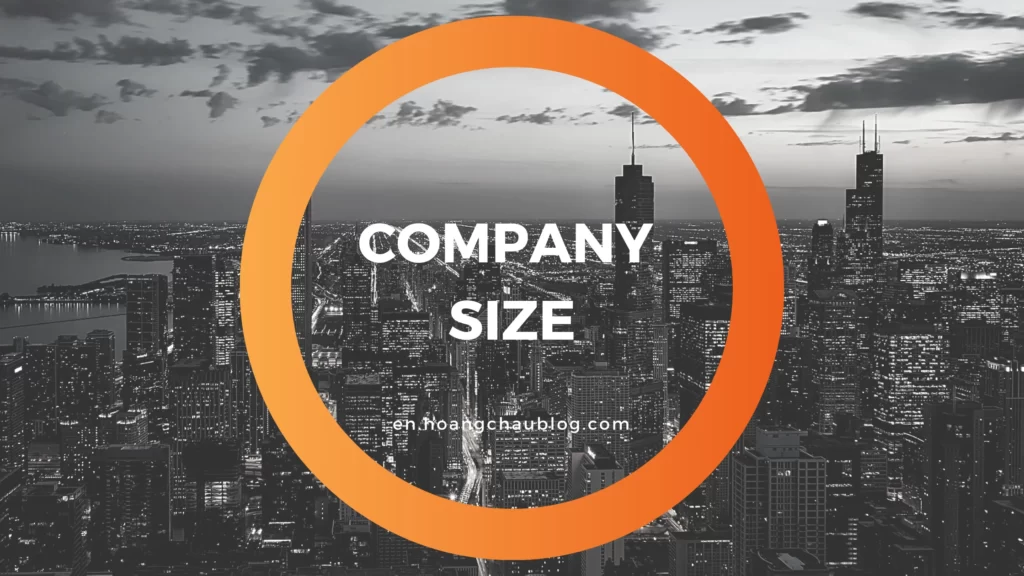The company size greatly affects the way the business operates, thereby directly affecting your work. That’s why everyone should learn a little bit about the size of the business is small, medium, or large to be able to somewhat imagine how it works. So what criteria to determine the size of the business?
Since the content discussed herein is job-related, the size will be based on the company’s headcount, not revenue or product. The extent of spread across many fields, industries, and corporate models will also be a point that we cannot anticipate when going to work.
Currently, with the trend of constant development, many businesses have developed beyond the single-sector working model (only doing business based on a certain industry). Many owners diversify their production and business activities and create models of corporations or multi-industry companies.
New industries, business models, or customer segments that have not been reached today are always exploited to the fullest extent, creating more choices for people to improve their quality of life.
Level of work framework
The first factor that the size and scope of businesses affect our daily work, that is the level of creativity or framework in the work. To make it easy for you to imagine, if a business in a department has too many people doing the same job content. And more specifically, each person does it in a different way than they were familiar with before. This makes the work results not only of the department but sometimes the whole company greatly affected.
With a large-scale and single-industry business, operating and developing long enough in the field they are doing, the processes, forms, and rules will always be oriented quite clearly. It will be the guideline for all activities and how individuals behave towards each other. This is especially to ensure consistency and for the majority to follow a path that the leaders have planned.
Getting the design right is extremely important in these corporate groups, and of course, your creativity will be greatly reduced in these environments. In return, if you need work experience, this is a good environment to learn with built-in knowledge and processes.
On the contrary, in a working environment where you are the only one in the position of the business that has not been established for a long time, your small scale, flexibility, and creativity will be enhanced. Such businesses always give space for employees to develop thinking to improve working processes, encouraging creativity and innovation.
However, it will not be rare for those positions to not have SOP or standard steps to do the job, but are still in the trial and error phase to arrive at complete optimization. The number of employees (size of business) and especially the number of colleagues you have in the position will greatly affect the level of creativity or framework in your work.
Firm size affects flexibility
Firm size and degree of diversity also affect the flexibility or rigidity of a business.
Imagine a business with 20 employees and a business with 2,000 employees. This will be very different when making decisions. With a small number of employees and the apparatus is not too cumbersome, the change will be very easy to implement because it basically does not cost too much time.
Changing something in a large-scale enterprise takes a lot of effort. It affects and interacts with many individuals, and of course, each individual will have many different reactions including both for and against. Not to mention how well the business communicates about the change so that people understand that there are things that need to be adjusted to achieve a better outcome.
For businesses that span multiple industries, change takes even longer because of the heterogeneity of customers, processes, and interactions. But corporate decisions cause far greater chaos than member firms.
It can therefore be said that the more cumbersome the apparatuses, the lower the flexibility of work-related decision-making, not to mention the need for multiple levels of review and study of the results, sometimes the consequences. This with small businesses, operating in a single industry is not too big of a problem. Flexibility and being good at converting always seem to be one of their strong points.
Detailed or general work?
And one point you can note about the difference between businesses is whether you are oriented to work in detail or in general. In other words, do you want to specialize in a specific job or want to diversify your knowledge based on multi-tasking? The size of your business plays a very important role in determining how much you “diversify” your work.
In small businesses, it is difficult for leaders to separate job positions into specialized areas. It will be a waste of human resources when that specialized part does not take up too much time each day to handle because the number of incidents is actually not much. The more diverse, the larger the scale, but the more complex the generation and the different situations.
It is therefore not surprising that we see small and medium enterprises with “concurrent” positions. Being in that position won’t give you an overly specific work routine or focus on one or a few objects. These positions require the performer to do many different tasks, and each task will be handled with a moderate level of depth. There are not too many dilemmas but there will be many related cases each day spread across many areas for you to handle.
In these positions, what you will learn will be job coverage, versatility, and general knowledge. If you can synthesize well and gradually shape a full picture of the work, the experience of working in small and medium-sized enterprises will give you a lot of useful and fundamental things for you to work in management positions in the future.
In contrast to large and super large enterprises, in-depth knowledge and skills in one area will be all you need to demonstrate and develop efforts to get the job done. Usually, however, the more specialized the level of requirements, the more individual colleagues, superiors, or pre-written procedures will support you in your work.
Therefore, you should determine in advance whether you prefer to do detailed or comprehensive work. And the size and extent of the industry spread of the business will significantly affect the job content of positions in that business.





